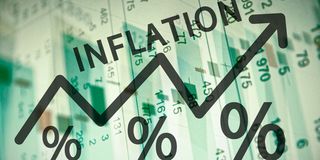Premium
February inflation hits 5-month high on food, transport costs

The year-on-year inflation rate in Kenya keeps rising.
Inflation hit a five-month high of 3.5 percent in February on rising costs of food and transportation.
Data from the Kenya National Bureau of Statistics (KNBS) shows overall inflation has grown for the last five consecutive months even as the rate remains below the mid-point target of five percent.
February inflation was 0.2 percentage points higher than 3.3 percent in January and is the highest since October 2024's 2.7 percent headline inflation rate.
“This is an indication of the general price level in February 2024. The price increase was primarily driven by rising prices in the food and non-alcoholic beverages category at 6.4 percent and the transport category at 0.7 percent over the same period,” KNBS said in a statement on Friday.
On a month over month basis, sugar, cooking oil (salad) and tomatoes went up by 3.2 percent, 1.6 percent and 1.3 percent respectively revealing the underlying food cost pressures.
Tomatoes, sukuma wiki and potatoes have marked the largest price increase among food commodities on a year over year basis with a kilogram of sukuma wiki/kale for instance rising to Sh83.32 from Sh65.37.
Steeper transport costs are meanwhile mirrored by increased local flights fares where a single ticket averaged Sh12,808.89 from Sh10,603.80 at the same time last year.
The rising food prices are partly attributable to seasonality patterns with the prevailing dry conditions dampening the output of key food commodities such as vegetables and cereals.
“Most respondents to the January 2025 Agriculture Survey expect some moderate upward pressure on overall inflation in the next three months on account of higher vegetables and cereals prices attributed to seasonal factors,” the Central Bank of Kenya (CBK) indicated in a presentation earlier this month.
Non-core inflation which shows price changes for volatile commodities including non-processed food items such as vegetables jumped to a six-month high of 8.2 percent from 7.1 percent in January, reflecting the higher food costs.
Core inflation which excludes volatile food and energy prices remained unchanged at two percent showing limited second-round effects from the higher overall inflation rate.
Overall inflation is expected to hold below five percent over the short run on stable pump prices and exchange rate.
“The January 2025 Agriculture Sector Survey, and CBK projections show that inflation is expected to remain below the mid-point of the target range in the near term,” CBK added.





